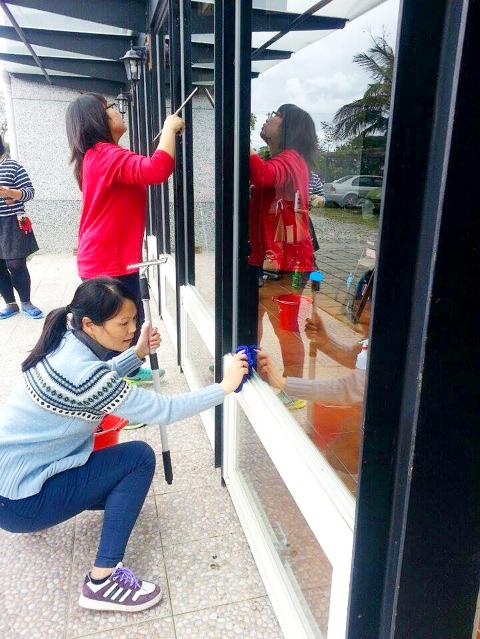Everyone knows how to do the cleaning, but how do you get the most out of cleaning equipment and cleaning products? And what’s the best method for getting the job done? The Hualien County branch of the Taiwan Fund for Children and Families (TFCF) has designed a special “Happy mothers domestic management course” to provide training for single-parent mothers to gain proficiency in cleaning. The course gives guidance to dozens of single mothers, in order to provide them with some pointers for employment in the future.
Hualien’s TFCF says Hualien has a large number of tourist hotels and many single-parent mothers make a living from cleaning, but sweeping away stubborn stains and grime requires not only the right cleaning products and equipment, but also the correct methods. Therefore, the TFCF has invited Tsao Sheng-chao, an expert from the cleaning industry, to take up duties as a lecturer. Tsao has worked in the cleaning industry since 1981 and has been employed as a cleaner at many famous hotels.
Tsao personally brings a multitude of products to his lectures and explains how each range of products is used. Taking glass as an example, Tsao says many people believe a simple wipe is fine, but mistakenly use a cleaning cloth which may make the glass more dirty the more it is wiped. Tsao says cleaning appears simple but in fact every process requires its own technique. One often sees a black ring around hotel lavatories — this is not dirt, but is caused by the incorrect use of cleaning products, says Tsao, and demonstrates the importance of using both the correct product and the correct technique.

Photo: Wang Chin-yi, Liberty Times
照片:自由時報記者王錦義
(Liberty Times, translated by Edward Jones)
清潔工作人人會,但如何有效運用工具、用品,還需要對的方法。花蓮家扶中心為培訓十多名單親媽媽一技之長,特地開設「幸福媽媽家事管家課程」,為其提供未來就業方向。
花蓮家扶指出,花蓮觀光飯店林立,許多單親媽媽以打掃為業,但要讓頑垢的髒汙一掃而空,除適當的清潔品及工具,還需要對的方法。因此邀請清潔業達人曹勝兆擔任講師,他自一九八一年即投入該行業,承接多加知名飯店清潔工作。
曹勝兆親自準備眾多用品,介紹各種品項的使用,他以玻璃為例,許多人認為簡單好擦拭,但錯誤的拿抹布,很可能會導致愈擦愈髒。他說,清潔工作看似簡單,但每一項都具技巧,常看到飯店廁所有一條黑汙,這並非髒垢,而是不當清潔品的使用導致,因此用對清潔品及方法很重要。
(自由時報記者王錦義)

Even as he grows older, Microsoft founder Bill Gates still fondly remembers the catalytic computer code he wrote 50 years ago that opened up a new frontier in technology. Although the code that Gates printed out on a teletype machine may look crude compared to what’s powering today’s artificial intelligence platforms, it played a critical role in creating Microsoft in April 1975 — a golden anniversary that the Redmond, Washington, company celebrated on April 4. Gates, 69, set the stage for that jubilee with a blog post reminiscing on how he and his old high school friend — the late Paul Allen

Australia’s strict immigration policies have long been criticized, particularly for how they treat people with disabilities. Having been residents of Australia for years, Scottish Laura Currie and her Italian partner, Dante Vendittelli, recently experienced the impact of these immigration policies. Their son Luca, born in Australia and diagnosed with cystic fibrosis, became the reason their residency application was denied due to the anticipated high healthcare costs. Had Luca been healthy, there would have been no objections to their permanent residency. This case not only highlights discrimination against disabled individuals, but also raises questions about fairness and inclusion within Australia’s immigration

A: After holding nine concerts in Kaohsiung and Taipei recently, “God of Songs” Jacky Cheung will stage three extra shows later this week. B: They’re compensation for the three shows he postponed last year due to illness. A: He also canceled three more shows in Guangzhou last month. His health is worrisome. B: When touring Guangzhou, he dedicated his hit “She Is Far Away” to late singer Khalil Fong. That’s so touching. A: Online music platform KKBOX has also launched a campaign to pay tribute to Fong. I can’t believe he died so young: he was only 41. A:

The study had several issues. Small sample sizes made it hard to draw __7__ conclusions. Additionally, taking a __8__ like pure MSG on an empty stomach is likely to make a person ill in any case. Choosing individuals who already had a history of the symptoms could have created a bias because they were likely to __9__ the reactions again. When real scientific research on the effects of MSG was eventually done, many of the myths surrounding it were proven __10__. The U.S. Food and Drug Administration and other global organizations have found MSG safe to eat. Today, MSG